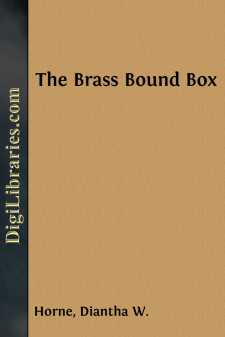Categories
- Antiques & Collectibles 13
- Architecture 36
- Art 48
- Bibles 22
- Biography & Autobiography 813
- Body, Mind & Spirit 142
- Business & Economics 28
- Children's Books 17
- Children's Fiction 14
- Computers 4
- Cooking 94
- Crafts & Hobbies 4
- Drama 346
- Education 46
- Family & Relationships 57
- Fiction 11829
- Games 19
- Gardening 17
- Health & Fitness 34
- History 1377
- House & Home 1
- Humor 147
- Juvenile Fiction 1873
- Juvenile Nonfiction 202
- Language Arts & Disciplines 88
- Law 16
- Literary Collections 686
- Literary Criticism 179
- Mathematics 13
- Medical 41
- Music 40
- Nature 179
- Non-Classifiable 1768
- Performing Arts 7
- Periodicals 1453
- Philosophy 64
- Photography 2
- Poetry 896
- Political Science 203
- Psychology 42
- Reference 154
- Religion 513
- Science 126
- Self-Help 84
- Social Science 81
- Sports & Recreation 34
- Study Aids 3
- Technology & Engineering 59
- Transportation 23
- Travel 463
- True Crime 29
The Brass Bound Box
by: Diantha W. Horne
Description:
Excerpt
LEGACY AND LEGATEE
Marsden was one of the few villages of our populous country yet left remote from any line of railway. The chief events of its quiet days were the morning and evening arrivals and departures of the mail-coach, whose driver still retained the almost obsolete custom of blowing a horn to signal his approach.
All Marsden favored the horn, it was so convenient and so—so antique! which word typified the spirit of the place. For if modest Marsden had any pride, it was in its own unchanging attitude toward modern ways and methods. So, whenever Reuben Smith's trumpet was heard, the villagers knew it was time to leave their homes along the main street and repair to the "general store and post-office" for the mail, which was their strongest connecting link with the outside world.
Occasionally, too, the coach brought a visitor to the village; though this was commonly in summer-time, when even its own stand-offishness could not wholly repel the "city boarder." After the leaves changed color, nobody went to and fro save those who "belonged," as the storekeeper, the milliner, and Squire Pettijohn, the lawyer; and it had been ten years, at least, since Reuben's four-in-hand was brought to a halt before Miss Eunice Maitland's gate. Now, on a windy day of late September, the two white horses and their two black companions were reined up there, while the trumpet gave a blast which startled the entire neighborhood.
"My heart was in my mouth the minute I heard it!" declared the Widow Sprigg to a crony, later on; although this curious disarrangement of her anatomy did not prevent the good woman from being foremost at the gate to learn the cause of this salute, thus rudely anticipating her mistress's rights in the case. Therefore, it was upon a time-damaged, cap-frilled countenance that Katharine Maitland's dismayed glance fell as she sprang from the stage and inquired:
"Are you my Aunt Eunice?"
"Your—Aunt—Eunice! Thank my stars, I ain't aunt to nobody!" returned the widow, almost as much alarmed by the appearance of this strange maiden as she had been by the coachman's blast.
"It is a matter of thankfulness," retorted the girl, pertly, and surveying the other with amused and critical eyes, which made Susanna Sprigg "squirm in her shoes."
Reuben now slowly climbed down from his high seat, and removed from the rumble a great trunk, a suit-case, a parcel of books, and a dog-basket; and the stranger at once occupied herself in releasing from his confined quarters a pug so atrociously high-bred that Susanna instantly exclaimed:
"My stars! That dog's so humbly he must ache!"
Katharine would have given a crisp reply had not her attention been distracted by Reuben's movements, who was waiting to receive his fare, yet in such terror of the pug's snapping jaws that he was stepping up and down in a lively fashion, as he rescued one foot and then the other from his enemy's attack.
"'Pears to blame me for bein' shut up in that there basket, don't he? When anybody knows 'twasn't my fault at all....




